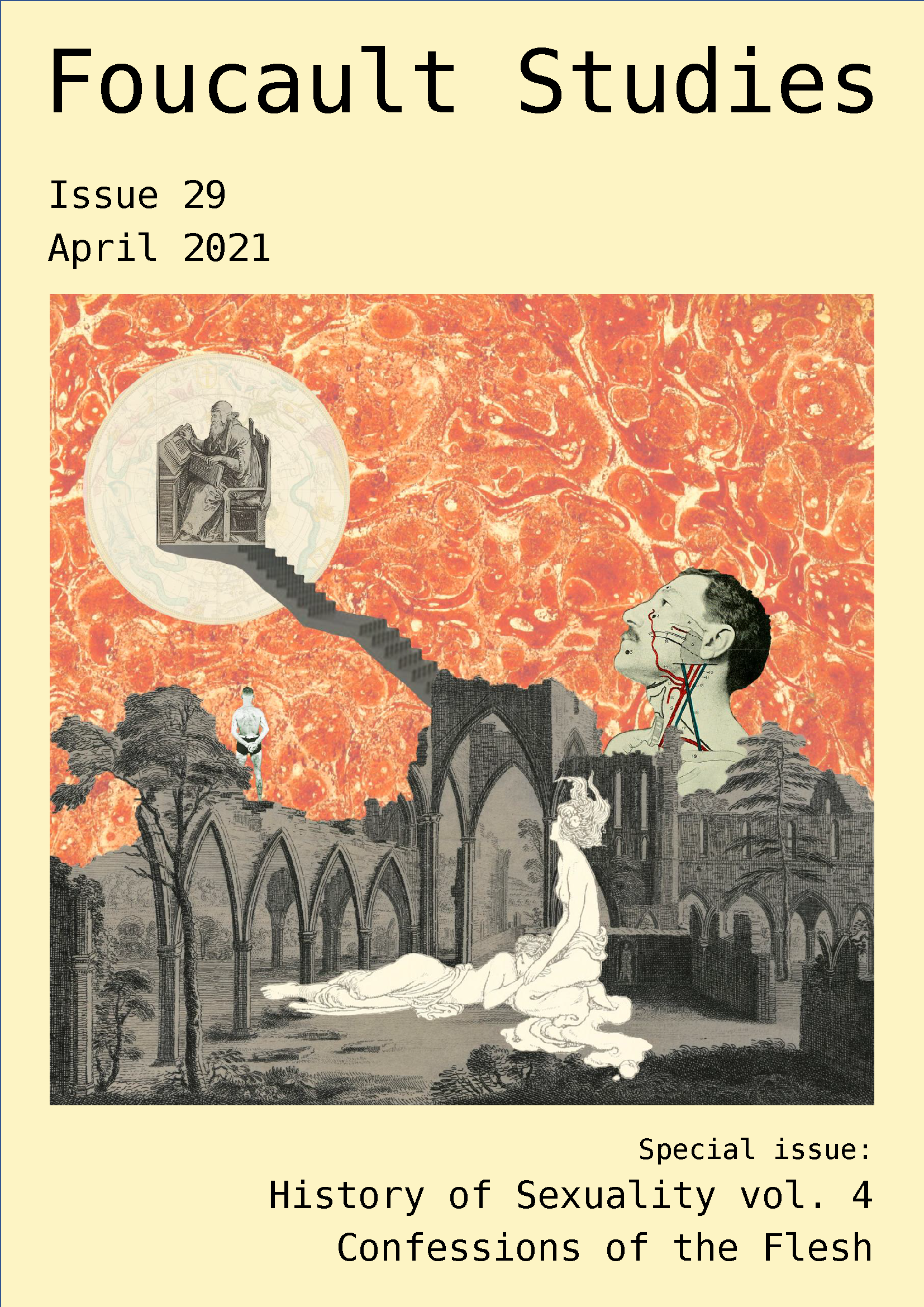Foucault’s Concept of Confession
DOI:
https://doi.org/10.22439/fs.vi29.6210Nøgleord:
Foucault, IdeologyResumé
Setting out from the difficulty of translating the Foucauldian notion of aveu, this paper proposes an account of Foucault’s concept of confession in the years 1979-1983 surrounding the writing of Confessions of the Flesh. I focus on Foucault’s relative failure to bring together the complementary dimensions of confession as confession of sins and confession of faith in early Christianity. Foucault’s attempts to tackle this challenge nonetheless reveal a number of crucial aspects of his thought throughout the 1970s, e.g., the critique of the notion of ideology and the role that critique played in the setting of Foucault’s “critical philosophy of veridictions”. A comparison with the lectures given at Louvain and the Collège de France suggests that Foucault took an original and rather solitary path in Confessions of the Flesh, which may explain the surprises awaiting the reader. Finally, I propose an explanation of Foucault’s final shift away from Christian confession towards Greek parrhesia, pointing to the key role of the idea of a “duty of truth”. This idea led Foucault to an original approach to confession and the illocutionary force of statements.
Referencer
Balibar, Étienne, “Dire, contredire: Sur les formes de la parrêsia selon Foucault,” in Libre Parole, 81–125. Paris: Galilée, 2018.
Bernauer, James, “Confessions of the soul: Foucault and Theological Culture,” Philosophy and Social Criticism 31:5–6 (2005), 557–572. https://doi.org/10.1177/0191453705055489
Büttgen, Philippe, “Aveu et confession,” in Foucault, les Pères, le sexe. Autour des Aveux de la chair, ed. Philippe Büttgen, Philippe Chevallier, Agustín Colombo and Arianna Sforzini. Paris: Éditions de la Sorbonne, 2021, 85–107.
Büttgen, Philippe, “Formules de foi et d’attestation,” Philosophie 145 (2020), 30–46. https://doi.org/10.3917/philo.145.0030
Büttgen, Philippe, “Théologie politique et pouvoir pastoral,” Annales. Histoire, Sciences Sociales 62:5 (2009), 1129–1154.
Courcelle, Pierre, Recherches sur les Confessions de saint Augustin. Paris: de Boccard, 1950.
Dyrberg, Torsten Bech, Foucault and the Politics of Parrhesia. Basingstoke: Palgrave MacMillan, 2014.
Elden, Stuart, “The Problem of Confession: The Productive Failure of Foucault's History of Sexuality, Journal for Cultural Research 9:1 (2005), 23–41.
Foucault, Michel, Abnormal: Lectures at the Collège de France, 1974–1975, ed. Valerio Marchetti and Antonella Salamoni [1999]. London: Verso, 2003.
Foucault, Michel, “Christianity and Confession,” in The Politic of Truth, ed. Sylvère Lotringer and Lysa Hochroth, 199–236 [1980]. New York: Semiotext, 1997.
Foucault, Michel, Confessions of the Flesh (The History of Sexuality, Vol. 4), ed. Frédéric Gros [2018]. New York: Pantheon, 2021.
Foucault, Michel, Discipline and Punish: The Birth of the Prison [1975]. New York: Vintage Books, 1995.
Foucault, Michel, “‘Introduction’ à L’Archéologie du savoir,” ed. Martin Rueff, Les Études philosophiques, 153:3 (2015), 327–351. https://doi.org/10.3917/leph.153.0327
Foucault, Michel, “L’évolution de la notion d’‘individu dangereux’ dans la psychiatrie légale du XIXe siècle“ [1978], in Dits et écrits, Vol. 3, ed. Daniel Defert and François Ewald, 443-464. Paris: Gallimard, 1994.
Michel Foucault, On the Government of the Living: Lectures of the Collège de France, 1979–1980, ed. Michel Senellart [2012]. Basingstoke: Palgrave Macmillan, 2014.
Foucault, Michel, “Subjectivity and Truth,” in The Politic of Truth, ed. Sylvère Lotringer and Lysa Hochroth, 171–198 [1980]. New York: Semiotext, 1997.
Foucault, Michel, The History of Sexuality, Vol. 1: An Introduction [=The Will to Knowledge] [1976]. New York: Pantheon Books, 1979.
Foucault, Michel, “The Concern for Truth,” in Michel Foucault: Politic, Philosophy, Culture. Interviews and Other Writings, 1977-1984, ed. Lawrence D. Kritzman, 255–270 [1984]. New York and London: Routledge, 1990.
Foucault, Michel, The Government of Self and Others: Lectures at the Collège de France, 1982-1983, ed. Frédéric Gros [2008]. Basingstoke, Palgrave Macmillan, 2011.
Foucault, Michel, Théories et institutions pénales. Cours au Collège de France (1971-1972), ed. Bernard E. Harcourt et alii. Paris: EHESS/Gallimard/Seuil, 2015.
Foucault, Michel, Wrong-Doing, Truth-Telling: The Function of Avowal in Justice, ed. Fabienne Brion and Bernard E. Harcourt [2012]. London and Chicago, IL: The University of Chicago Press, 2014.
Gehring, Petra, and Andreas Gelhard (ed.), Parrhesia: Foucault und der Mut zur Wahrheit. Zurich: Diaphanes, 2012.
Lorenzini, Daniele, “Foucault et la force des mots : de l’extralinguistique à la subjectivation,” Phantasia 8 (2019). https://doi.org/10.25518/0774-7136.944
Lorenzini, Daniele, La Force du vrai: De Foucault à Austin. Lormont: Le Bord de l’eau, 2017.
Lorenzini, Daniele, “Performative, Passionate, and Parrhesiastic Utterance: On Cavell, Foucault, and Truth as an Ethical Force,” Critical Inquiry 41:2 (2015), 254–268. https://doi.org/10.1086/679074
Lorenzini, Daniele and Tazzioli, Martina, “Confessional Subjects and Conducts of Non-Truth: Foucault, Fanon, and the Making of the Subject,” Theory, Culture and Society 35:1 (2018), 71–90. https://doi.org/10.1177/0263276416678291
Landry, Jean-Michel, “Confession, Obedience, and Subjectivity: Michel Foucault’s Unpublished Lectures On the Government of the Living,” Telos 146 (2009), 111–123. https://doi.org/10.3817/0309146111
Lynch, Thomas, “Confessions of the Self: Foucault and Augustine,” Telos 146 (2009), 124–139. https://doi.org/10.3817/0309146124
Martin, Craig, “Ideology and the Study of Religion: Marx, Althusser, and Foucault,” Religion Compass 7:9 (2013), 402–411. https://doi.org/10.1111/rec3.12062
Morlet, Sébastien, “L’exégèse d’une exégèse: Foucault, lecteur de Chrysostome,” in Foucault, les Pères, le sexe. Autour des Aveux de la chair, ed. Philippe Büttgen, Philippe Chevallier, Agustín Colombo and Arianna Sforzini. Paris: Éditions de la Sorbonne, 2021, 139–158.
Plant, Bob, “The Confessing Animal in Foucault and Wittgenstein,” The Journal of Religious Ethics 34:4 (2006), 533–559. https://doi.org/10.1111/j.1467-9795.2006.00284.x
Ratzinger, Joseph, “Originalität und Überlieferung in Augustins Begriff der ‘Confessio’,” Revue des études augustiniennes 3/4 (1957), 376–392. https://doi.org/10.1484/j.rea.5.103956
Simonetta, David, “L’archive de L’Archéologie du savoir. Les sources anglophones (positivisme logique, logique, philosophie analytique),” in Alain de Libera, L’Archéologie philosophique: Séminaire du Collège de France 2013-2014, 253–258. Paris: Vrin, 2016.
Taylor, Chloë, The Culture of Confession from Augustine to Foucault: A Genealogy of the ‘Confessing Animal’. London and New York, Routledge, 2009.
Downloads
Publiceret
Citation/Eksport
Nummer
Sektion
Licens
Authors retain copyright to their work, but assign the right of the first publication to Foucault Studies. The work is subject to a CC BY-NC-ND 4.0 license, but despite these restrictions, authors can take for granted that Foucault Studies will permit articles published in Foucault Studies to be translated or reprinted in another format such as a book providing a full reference is made to Foucault Studies as the original place of publication.



